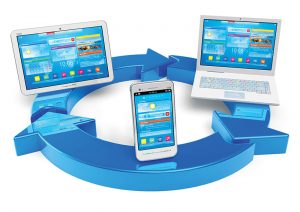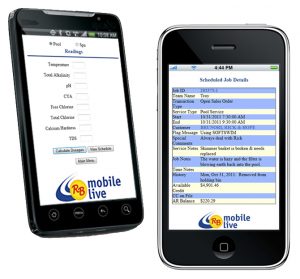Today, one can go beyond using their smartphone for socializing, texting and e-mailing. With the mobile industry growing at an outstanding pace, the widespread use of these devices has provided a new age of increased productivity and flexibility for pool and spa professionals in the field.
‘Mobile app’ is a term used to describe Internet applications that run on smartphones, tablets and similar devices. They connect users to online services, which are more commonly accessed via computers, making it easier to use the Internet on a portable device. There are hundreds of thousands of apps available, with new ones released almost daily. There are apps available to organize calendars, check the weather, play games, monitor personal diets and even pinpoint a particular geographic location. Some apps are free, while others must be purchased. Many are built around the immediate needs of the user, helping them to obtain information when it is needed and as quickly as possible.
Offline and web-based applications

A web-based app requires an Internet connection and provides up-to-the-minute accuracy between the service technician’s mobile device and the company’s point-of-sale (POS) software.
Two types of apps are offered: web-based and offline. A web-based app requires an Internet connection and provides up-to-the-minute accuracy between the service technician’s mobile device and the company’s point-of-sale (POS) software. On the other hand, an offline app still makes recording service call details easier; however, it requires the recorded data to be transferred or synchronized with the company’s POS system or computer database at a later time.
When using web-based apps that connect to the company’s network, which houses the POS software, it is important to always maintain Payment Card Industry (PCI) compliancy. The rules of compliancy are written to protect the dealer and customers from ‘hackers’ who try to gain access to steal vital information like credit card numbers. The Payment Card Industry Data Security Standard (PCI DSS) is a security standard for organizations that handle cardholder information for the major debit and credit card companies. Further, depending on the system, the app may need to be accessed through a virtual private network (VPN), which is a tunnel between two devices that uses public Internet, where all data traffic is encrypted. The encryption protects the data from anybody ‘snooping’ on the Internet.
Increasing service efficiency
Growth and development of mobile apps are driven by the same factors that motivate other information technology (IT) and business process changes, such as the need to optimize the efficiency of staff resources, improve productivity and increase customer satisfaction.

Working through a mobile app can eliminate service forms by allowing technicians to record notes specific to each client directly on their smartphone.
With a business as seasonal as the pool and spa industry, time is always at a premium. Apps that provide service technicians access to a company’s POS or business management system increases overall efficiency by allowing service orders to be processed and updated on the job site. This also saves valuable time when logging service call information for billing and record-keeping purposes, which further reduces the company’s overhead costs.
Depending on the app, technicians can also review their scheduled service calls, as well as retrieve customer information, such as equipment profile, previous history, job site directions and any pictures on record. These apps can also provide immediate access to all schedule and pricing updates implemented at the office, while office personnel would be instantly informed about the work performed in the field. Streamlining the company’s flow of operations and communication can make everyone’s job easier, not to mention more cost effective.
Due to the small screen sizes on smartphones, most mobile apps display simple screens and take advantage of touchscreen technology, which allows technicians to intuitively use the application. For example, a technician can simply select basic options from drop-down menus, click on checkboxes and enter some customer notes within the POS app on their smartphone. Once completed, the data is sent to the office in real-time, while simultaneously creating an electronic document of the service call for the customer.
Further, working through a mobile app can eliminate service forms by allowing technicians to record notes (e.g. water test results, visible water problems and other work performed) specific to each client directly on their smartphone. Using an app to automatically calculate recommended chemical dosages and record them as a matter of permanent record not only makes more efficient use of time but also helps eliminate mistakes.
What’s in stock?
Mobile apps also make controlling inventory easier and more accurate. They allow technicians to access product information and features, check pricing and availability, as well as reference crossover part numbers from the company’s POS system.
Smartphone cameras, along with a universal product code (UPC) app, make it possible for service professionals to perform a physical inventory of products on their truck to keep records up to date. Parts can also be applied to service orders by utilizing the UPC on the products in the service vehicle to help eliminate lost customer orders. This puts the service order in front of the purchasing agent immediately. The quicker the order can be placed, the sooner the customer’s pool or spa can be serviced.
In some cases, business owners and managers can even utilize their smartphones to view open work shifts and sales totals from anywhere at any time. A smartphone that is connected to the company’s POS system offers executives a means to stay connected and informed without having to call the store, the service technicians or the office.
Getting started
With the number of apps available to the pool and spa industry, it can be difficult to know where to start. Before upgrading every technician’s cell phone, first perform some research to determine which apps best meet the company’s needs. For instance, not all apps are available for every mobile operating system. Sometimes abbreviated as mobile OS, an operating system for a mobile device is the software platform on top of which the app runs. The three main application platforms include Android, iOS and Blackberry.
To ensure compatibility, companies that are interested in using a mobile app to improve efficiencies, but already employ a particular fleet of smartphones, should contact their POS software provider, as well as some of the manufacturers they regularly deal with to determine which app is better suited to meet the company’s needs.
Although most apps are available for each platform, companies that are not using smartphones but are interested in doing so may find it easier to select a smartphone by determining what apps are available first.
If there are no current plans to upgrade the company’s mobile phones, consider incurring the costs to make the change necessary to benefit the company’s bottom line. Having the wrong type of mobile phones or tablets should not prevent a business from using tools that can increase efficiency and provide better customer service.
Today, most pool and spa industry POS systems have mobile applications available. There is no better time than now to begin utilizing new technology that can help increase profits by maximizing efficiency. In addition to keeping service and repair technicians trained on the latest pool equipment and chemical information, business owners should also consider moving to new technologies to streamline their business, improve productivity and cut costs.
This article was written by Corinne Kraft and originally appeared on Pool & Spa Marketing [link].
